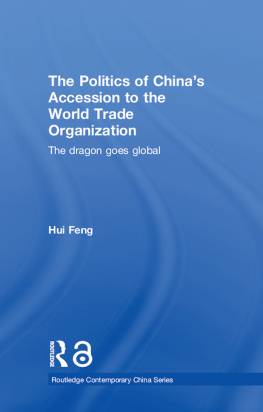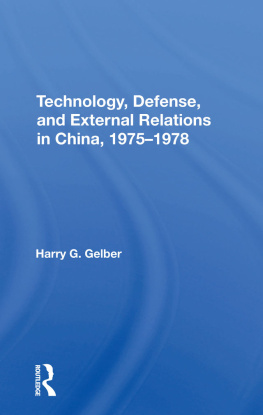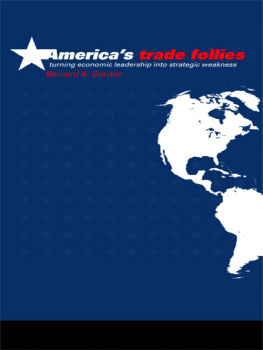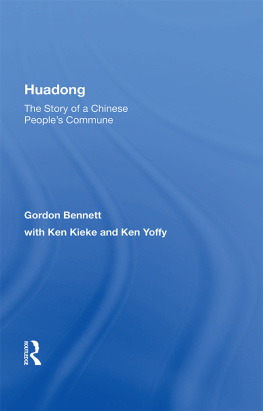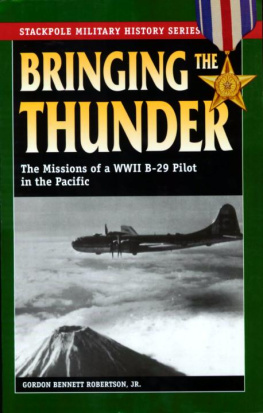China's Finance and Trade
China's Finance and Trade
A Policy Reader
EDITED BY
Gordon Bennett
First published 1978 by M.E. Sharpe and THE MACMILLAN PRESS LTD
Reissued 2018 by Routledge
2 Park Square, Milton Park, Abingdon, Oxon OX14 4RN
711 Third Avenue, New York, NY 10017, USA
Routledge is an imprint of the Taylor & Francis Group, an informa business
Copyright 1978 by Taylor & Francis
No part of this book may be reprinted or reproduced or utilised in any form or by any electronic, mechanical, or other means, now known or hereafter invented, including photocopying and recording, or in any information storage or retrieval system, without permission in writing from the publishers.
Notices
No responsibility is assumed by the publisher for any injury and/or damage to persons or property as a matter of products liability, negligence or otherwise, or from any use of operation of any methods, products, instructions or ideas contained in the material herein.
Practitioners and researchers must always rely on their own experience and knowledge in evaluating and using any information, methods, compounds, or experiments described herein. In using such information or methods they should be mindful of their own safety and the safety of others, including parties for whom they have a professional responsibility.
Product or corporate names may be trademarks or registered trademarks, and are used only for identification and explanation without intent to infringe.
Publisher's Note
The publisher has gone to great lengths to ensure the quality of this reprint but points out that some imperfections in the original copies may be apparent.
Disclaimer
The publisher has made every effort to trace copyright holders and welcomes correspondence from those they have been unable to contact.
A Library of Congress record exists under LC control number: 77099080
ISBN 13: 978-1-138-04506-4 (hbk)
ISBN 13: 978-1-315-17215-6 (ebk)
To
My father, James Lippincott Bennett
He was not merely a chip of the old block, but the old block itself.
Edmund Burke
The two disciplines of political science and economics each have distinctive interests in the Chinese development experience. Thus readers from each discipline should discover appropriately distinctive uses for the documentary excerpts assembled here. Political scientists see in China under Communist rule an unpredictable despotism moved by numerous democratic and progressive impulses. The political chemistry by which the Chinese manage to join these apparently contrary currents they find intriguing. Economists see in contemporary China a case of a developing country that has attacked market forces with a vengeance, but also has created enough public authority to implement a reasonably coherent development program. Chinese efforts to reconcile these apparently contradictory impulses they find just as intriguing.
For students of politics the documents in this collection offer an opportunity to analyze a broad policy area finance and commerce in search of specific mechanisms by which dictatorship and popular will are both given expression in political life. The Chinese have divided their administration into six overarching systems, one of which is "finance-trade." Narrowing the scope of investigation to one policy system like finance trade is a helpful way to break down Chinese politics as a whole into a less complex analytical part. Other ways, of course, include selection of a particular region, institution, decision or period. The relative virtues of "public policy" approaches to comparative analysis are discussed briefly in the Introduction. For students of economics these documents offer an opportunity to match Chinese policy declarations against ongoing traditions of economic theory, most of which regard Chinese-style "command economies" as irrational. The central issue, I suspect, is the degree to which Chinese dedication to "external" criteria beyond material progress invites the "irrational" judgment from In Chinese policy, unlike the American scene portrayed so vividly by Secretary Kreps, "social needs" criteria appear as basic values of the party in power rather than as tactics adopted by enterprises to avoid costly regulation.
My own interest in the politics of economic policy in China has led me into the finance-trade area largely because it has been slighted. Much more and better literature is available on other sectors agriculture, small rural industries, industrial management, and labor and work incentives. Reports by recent visitors to China reflect the situation well. Most delegations have given all their attention to agricultural production in communes, "walking on two legs" in choice of techniques, factory organization, and pay scales. Hardly anyone has sought out a branch of the People's Bank, a supply and marketing cooperative, a wholesale market, an import-export corporation, a tax office, or a finance-trade oriented middle school or college for a site visit. By contrast, the PRC's own technical and propaganda publishing outlets give noticeable attention to this system.
Almost all the excerpts have been selected from Chinese Economic Studies , edited since its inception in 1967 by Professor George C. Wang and published by M. E. Sharpe, Inc., formerly International Arts and Sciences Press. Only in a few instances where I thought very significant material for this volume had not appeared in Chinese Economic Studies have I drawn upon other sources. Since Chinese policy literature tends to be very repetitive, I have decided to include here only unique, substantive passages. The repetitiveness is an interesting phenomenon in its own right as a device for inculcating important political norms, but for present purposes I have endeavored to avoid most of it.
My first acknowledgment must be to Professor Wang who made all the initial selections for the journal and supervised their translation. Then I would like to single out the energies of my editor at M. E. Sharpe, Douglas Merwin. Himself a scholar of classical China, Doug is responsible for initiating the China Book Project. He has offered me constant criticism and encouragement throughout the design and execution of this work. Finally I have words of loving gratitude for my wife, Carol. Not only did she lend a substantive hand in her capacity as economist, she also suggested many editorial improvements in her capacity as renaissance woman. Nonetheless, stubborn responsibility for what remains is mine alone.
Note
The New York Times , October 20, 1977. On the Business Roundtable, see "When Executives Lobby, Congress Listens," Christian Science Monitor , October 7, 1977.
A Case for "Public Policy" Approaches to China's Finance and Trade
The purpose I hope to advance in compiling these documentary excerpts on Chinese financial and commercial issues is to encourage application of "public policy" approaches to the study of Chinese politics. They have gained much currency in political science in recent years, and they promise some distinctive contributions. Their emphasis has been upon explaining substantive policy outcomes instead of explaining institutional arrangements, such as elite civilian-military relations, or political behaviors, such as campaign contributions. The analytical advantages of focusing on just one "policy subsystem" such as welfare, defense, or urban transit are several. First, for the policy area chosen, the analyst is more likely to see how various parts of a political system culture and ideology, public opinion and constituency pressures, interest groups, representative bodies, administrative and regulatory agencies, courts, political parties, executive leadership and others interact. Second, one is likely to be more sensitive to unique actors in the policy subsystem (professional scientists in the case of science policy, or parents in the case of education policy). In American politics, for example, we find that politicians often are willing to defer to doctors on medical matters, but rarely are they willing to leave war to the generals. Third, one is better able to appreciate unique technical characteristics of different policy areas. With respect to the arts, for example, legislatures may do as they will, boldly creating or heartlessly eliminating entire programs. With respect to government intervention in the economy, to the contrary, legislatures are not so free. Even a small change in banking regulations may set undesired repercussions in motion throughout the economy. Finally, one is more likely to look beyond single moments of decision to bring into view as well implementation and evaluation of policy. In short, as public studies accumulate, the gain to political theory should be our capacity to specify "policy area" or "subsystem" as a variable in more refined explanations of "the policy process."




